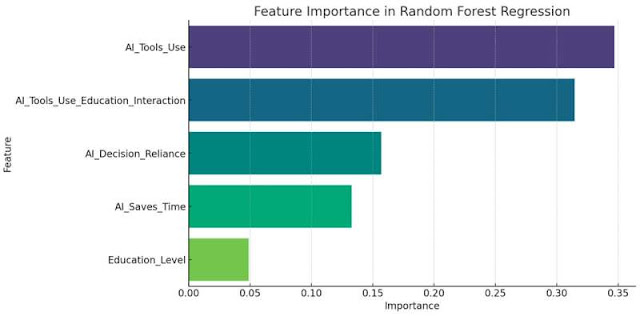Feature importance in random forest regression.
Credit: Societies (2025). DOI: 10.3390/soc15010006
A study by Michael Gerlich at SBS Swiss Business School has found that increased reliance on artificial intelligence (AI) tools is linked to diminished critical thinking abilities. It points to cognitive offloading as a primary driver of the decline.
AI's influence is growing fast. A quick search of AI-related science stories reveals how fundamental a tool it has become. Thousands of AI-assisted, AI-supported and AI-driven analyses and decision-making tools help scientists improve their research.
AI has also become more integrated into daily activities, from virtual assistants to complex information and decision support. Increased usage is beginning to influence how people think, especially impactful among younger people, who are avid users of the technology in their personal lives.
An attractive aspect of AI tools is cognitive offloading, where individuals rely on the tools to reduce mental effort. As the technology is both very new and rapidly being adopted in unforeseeable ways, questions arise about its potential long-term impacts on cognitive functions like memory, attention, and problem-solving under prolonged periods or volume of cognitive offloading taking place.
In the study "AI Tools in Society: Impacts on Cognitive Offloading and the Future of Critical Thinking," published in Societies, Gerlich investigates whether AI tool usage correlates with critical thinking scores and explores how cognitive offloading mediates this relationship.
A mix of quantitative surveys and qualitative interviews was used with 666 participants in the United Kingdom. They were distributed across three age groups (17–25, 26–45, 46 and older) and had varying educational backgrounds.
Quantitative data collection involved a 23-item questionnaire measuring AI tool usage, cognitive offloading tendencies, and critical thinking skills, utilizing scales like the Halpern Critical Thinking Assessment (HCTA). ANOVA, correlation, multiple regression, and random forest regression analyses provided statistical insights. Qualitative data from semi-structured interviews with 50 participants underwent thematic analysis for contextual depth.
AI's influence is growing fast. A quick search of AI-related science stories reveals how fundamental a tool it has become. Thousands of AI-assisted, AI-supported and AI-driven analyses and decision-making tools help scientists improve their research.
AI has also become more integrated into daily activities, from virtual assistants to complex information and decision support. Increased usage is beginning to influence how people think, especially impactful among younger people, who are avid users of the technology in their personal lives.
An attractive aspect of AI tools is cognitive offloading, where individuals rely on the tools to reduce mental effort. As the technology is both very new and rapidly being adopted in unforeseeable ways, questions arise about its potential long-term impacts on cognitive functions like memory, attention, and problem-solving under prolonged periods or volume of cognitive offloading taking place.
In the study "AI Tools in Society: Impacts on Cognitive Offloading and the Future of Critical Thinking," published in Societies, Gerlich investigates whether AI tool usage correlates with critical thinking scores and explores how cognitive offloading mediates this relationship.
A mix of quantitative surveys and qualitative interviews was used with 666 participants in the United Kingdom. They were distributed across three age groups (17–25, 26–45, 46 and older) and had varying educational backgrounds.
Quantitative data collection involved a 23-item questionnaire measuring AI tool usage, cognitive offloading tendencies, and critical thinking skills, utilizing scales like the Halpern Critical Thinking Assessment (HCTA). ANOVA, correlation, multiple regression, and random forest regression analyses provided statistical insights. Qualitative data from semi-structured interviews with 50 participants underwent thematic analysis for contextual depth.
Statistical analyses demonstrated a significant negative correlation between AI tool usage and critical thinking scores (r = -0.68, p < 0.001). Frequent AI users exhibited diminished ability to critically evaluate information and engage in reflective problem-solving.
Cognitive offloading was strongly correlated with AI tool usage (r = +0.72) and inversely related to critical thinking (r = -0.75). Mediation analysis revealed that cognitive offloading partially explains the negative relationship between AI reliance and critical thinking performance.
Younger participants (17–25) showed higher dependence on AI tools and lower critical thinking scores compared to older age groups. Advanced educational attainment correlated positively with critical thinking skills, suggesting that education mitigates some cognitive impacts of AI reliance.
Random forest regression (R2 = 0.37) and multiple regression analyses highlighted diminishing returns on critical thinking with increasing AI usage, emphasizing a threshold beyond which cognitive engagement significantly declines.
Recommend this post and follow
The birth of modern Man
https://disqus.com/home/forum/lifeofearth/


No comments:
Post a Comment
Stick to the subject, NO religion, or Party politics